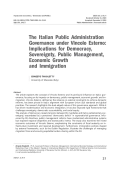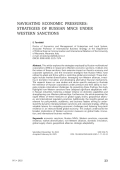The article explores the concept of Vincolo Esterno and its profound influence on Italy’s governance, focusing on its impacts on democracy, public management, economic growth, and immigration. Vincolo Esterno, defined as the reliance on external constraints to enforce domestic reforms, has been pivotal in Italy’s alignment with European Union (EU) standards and global practices. The research highlights the dual-edged nature of this governance approach. While it has driven modernization and economic integration, it has also imposed rigid frameworks that challenge sovereignty, democratic accountability, and social equity. The analysis of democracy reveals tensions between EU mandates and Italy’s parliamentary sovereignty, exacerbated by a perceived “democratic deficit” in supranational governance. Influenced by EU directives, public management reforms have modernized administrative systems but exposed regional disparities and bureaucratic inertia. The study also examines the mixed economic outcomes of Vincolo Esterno, emphasizing the constraints of fiscal austerity on infrastructure investment and regional development. Furthermore, immigration policies shaped by external frameworks, such as the Dublin Regulation, illustrate the challenges of managing migration flows and ensuring equitable burden-sharing within the EU.
This article explores the strategies employed by Russian multinational corporations (MNCs) in response to Western economic sanctions. It delves into the nature of these sanctions, their extensive impact on Russia’s economy and corporate operations, and the innovative strategies that Russian MNCs have utilised to adapt and thrive within a restrictive global environment. These strategies include market diversification, leveraging non-Western alliances, investing in domestic innovation, and developing alternative financial mechanisms. The research draws on case studies and sector-specific analyses to illustrate the resilience of Russian corporations under pressure and their ability to navigate complex international challenges. By presenting these findings, the study highlights how Western sanctions have catalysed significant adaptations within Russian industries, fostering a deeper reliance on domestic capabilities and strengthening non-Western partnerships. Furthermore, the article examines the ripple effects of these measures on global supply chains, geopolitical alliances, and international regulatory practices. Additionally, the insights gained are relevant for policymakers, academics, and business leaders aiming to understand the dynamic interplay between sanctions and corporate strategy, offering valuable lessons for navigating economic challenges and fostering long-term resilience in an interconnected global economy. This analysis underscores the broader implications of Western economic measures on global trade, innovation, and international business resilience.

